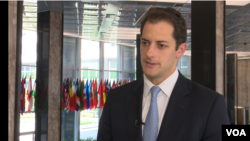A U.S. official responsible for Iran policy said Wednesday that one of the United States' first priorities following its exit from the 2015 Iran nuclear deal would be pressing European nations to reduce investments in the Iranian economy.
Andrew Peek, deputy assistant secretary of state for Near Eastern affairs, said in an exclusive interview with VOA Persian at the State Department that the Trump administration would tell European allies that it sees "real problems with business decisions that empower" Iran's Islamist rulers. He said those problems include enabling the Islamic Revolutionary Guard Corps to further penetrate Iran's economy and giving Tehran more currency to support "nefarious" activities abroad.
"We're going to be encouraging them to reduce those investments," Peek said, referring to European nations dealing with Iran. "We are going to engage them constantly, as we have been, to try to get to a place where we come to an agreement that better addresses the totality of the Iranian regime's threat."
Aircraft sales
The U.S. exit from the deal, announced Tuesday by President Donald Trump, already has affected plans by European aircraft manufacturers Airbus and ATR to sell civilian aircraft to Iran. Its national airline, IranAir, has ordered 100 passenger planes from Airbus and 20 from ATR, as well as 80 from U.S. manufacturer Boeing.
U.S. Treasury Secretary Steven Mnuchin, commenting hours after Trump spoke, said that as part of the U.S. reimposition of nuclear-related sanctions, he would revoke the existing U.S. licenses that allowed the three companies to make those sales. The European aircraft deals were dependent on the licenses because of the heavy use of American parts in European-made commercial planes.
Peek told VOA that the Trump administration was concerned about licensing civilian aircraft sales to Iran because of what he said was Tehran's use of such aircraft to conduct military activities in places like Syria. Iran has not acknowledged using passenger planes for such purposes.
"I would look to the Iranian government to stop misusing the ability to [buy] these airplanes — an ability it gained under the deal," he said.
Peek said Washington did not expect Tehran to take up Trump's offer of negotiations on a new deal anytime soon.
"We don't think the Iranian government at first will want to come to the table, especially on regional issues," he said. "This is one of the reasons we are pulling out [of the 2015 deal] — to increase our leverage to get to a better place with respect to not just the nuclear file, but also those regional issues." Trump cited Iran's "malign" and "sinister" involvement in conflicts in Syria and Yemen as part of the rationale for quitting the nuclear deal.
Iranian President Hassan Rouhani, in a televised statement following Trump's announcement, said Iran would consult with European powers, Russia and China in the next few weeks to determine whether it would be in its interest to remain in the deal. He also said the U.S. would not succeed in hurting the Iranian economy by reimposing nuclear-related sanctions.
Peek declined to speculate on whether or when Iran would respond to the U.S. offer of talks. "I suspect the increasing pressure on Iran [at some point] will help them make the right decisions in resolving these conflicts," he said.
Human rights
Peek said any such talks also would focus on Iranian "repression" of human rights.
"That is one of most troubling aspects of its behavior," he said. "I think an Iranian government that respects the right of its citizens to protest and share information, and that acts as a responsible member of the international community, is what the Iranian people will get behind. They are very much in our thoughts," he said.
This report was produced in collaboration with VOA's Persian service.





